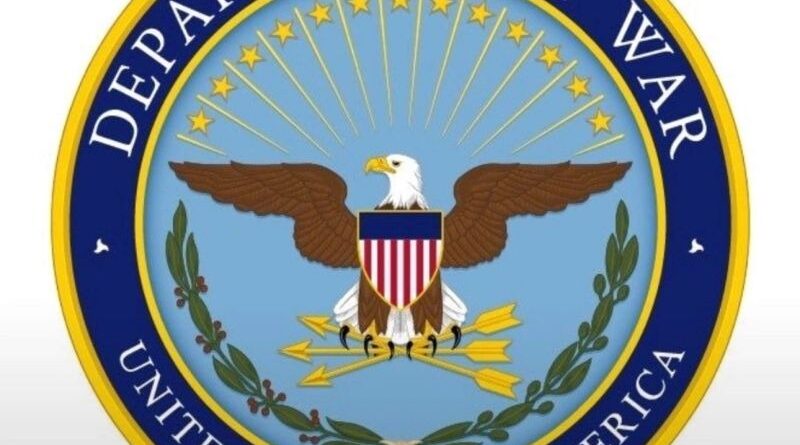Trump’s “War Department” and the Unraveling of American Alliances
From Symbol to Strategy
On September 5, 2025, President Donald Trump signed an executive order renaming the Pentagon the Department of War. In strictly legal terms, the order required congressional approval and carried no operational implications for the military chain of command. But the symbolism was immense. For the first time since the passage of the National Security Act of 1947, the United States abandoned the vocabulary of “defense” in favor of “war.”
The White House insisted the change was meant to highlight “peace through strength.” Yet for many in Washington and abroad, it marked a rupture with the principles of collective security and restraint that underpinned the U.S.-led order after World War II. The renaming crystallized a deeper transformation in American foreign policy under Trump’s second term: the retreat from alliances, the embrace of unilateral coercion, and the erosion of trust among partners. The question now facing strategists and historians alike is whether this represents a passing deviation—or the definitive unraveling of the postwar order.
From Defense to War: Undoing 1947
Words matter. The Department of War was the institutional pillar of U.S. military power until 1947, when the Truman administration created the Department of Defense. That change was more than semantic: it reflected America’s new commitment to collective defense, expressed in NATO, ANZUS, bilateral pacts in Asia, and the UN Charter’s prohibition on aggressive war.
By reviving the term “War,” Trump evoked an earlier America—more isolationist, more transactional—when neutrality acts and domestic politics kept the country aloof from global responsibilities. Allies interpreted the move as more than branding. It signaled a turn away from the architecture of collective defense and toward a doctrine of coercive unilateralism.
Since 1945, U.S. leaders from Truman to Reagan defined American credibility by the reliability of its commitments. Trump’s renaming suggested a reversal: foreign policy as transactional bargaining rather than enduring partnership.
Transactionalism Comes of Age
The shift did not begin in 2025. Trump’s first term already revealed his instinct to treat alliances as commercial deals rather than strategic assets. NATO members were castigated as “free riders.” South Korea and Japan were threatened with troop withdrawals. Canada and the EU were slapped with tariffs.
In his second term, this approach hardened into doctrine. South Korea was pressed to channel hundreds of billions into U.S. funds in exchange for tariff relief. Europe was compelled to purchase American LNG and weapons while facing 15–50 percent tariffs on its exports. Mexico was threatened with unilateral military strikes; Canada was mocked over Arctic sovereignty.
The cumulative effect was clear: U.S. commitments became bargaining chips. What once distinguished Washington from Moscow or Beijing—the predictability of its alliance leadership—eroded.
Ukraine: A Test of Credibility
Nowhere has this been more visible than in Ukraine. After Russia’s full-scale invasion in 2022, the Biden administration led NATO in its strongest display of unity since the Cold War. Ukraine received tens of billions in aid, and NATO expanded to include Finland and Sweden.
Trump reversed course. He suspended U.S. military assistance, belittled President Volodymyr Zelensky, and floated the idea of territorial concessions to Moscow. Vice President J.D. Vance went further, calling Ukraine “irrelevant” to U.S. interests.
For Kyiv, the impact was devastating. According to a March 2025 survey by the Kyiv International Institute of Sociology, 73 percent of Ukrainians said Trump’s presidency was bad for their country’s survival—a dramatic rise from just 21 percent in late 2024. For Europe, the lesson was unmistakable: U.S. support could evaporate overnight.
The EU scrambled to respond, launching joint defense initiatives and pledging more air defenses. Yet Europe remains overstretched. Instead of a transatlantic division of labor, Ukraine now symbolizes Western fracture.
Asia: Losing India, Empowering China
The Indo-Pacific was supposed to be the strategic pivot of 21st-century U.S. foreign policy. Successive administrations sought to strengthen the QUAD (U.S., Japan, India, Australia) as a counterweight to China. Trump’s second-term policies, however, have strained this architecture. Tariffs on Indian exports, justified on grounds of Delhi’s continued purchase of Russian oil, coincided with public disputes over Trump’s exaggerated claims of having “delivered peace” between India and Pakistan.
Support Independent Analysis
Help us keep delivering free, unbiased, and in-depth insights by supporting our work. Your donation ensures we stay independent, transparent, and accessible to all. Join us in preserving thoughtful analysis—donate today!
When Indian Prime Minister Narendra Modi declined to endorse Trump for the Nobel Peace Prize, relations soured further. The result has been a chilling of U.S.-India ties. Delhi has edged closer to Moscow and Beijing within BRICS, and Indian officials increasingly describe U.S. reliability as “conditional at best.” The strategic consequence is profound: by alienating India, Trump has undercut Washington’s Indo-Pacific strategy and empowered Beijing’s efforts to build an anti-American bloc.
The Cost of Eroded Trust
From Seoul to Berlin, Ottawa to Delhi, allies now see Washington as less a dependable guarantor than an unpredictable hegemon. Trust—long America’s greatest strategic asset—has frayed.
This erosion shows up in procurement and planning. Europe is investing in missile and drone programs independent of the U.S. Asian partners are diversifying trade. Middle Eastern states are hedging toward China and Russia. The result is not formal rupture but gradual hollowing-out: U.S. military dominance without the political cohesion that gave alliances weight.
Europe’s Hesitant Autonomy
Ironically, Trump has accelerated Europe’s pursuit of “strategic autonomy.” Initiatives once dismissed as bureaucratic—PESCO projects, the European Defence Fund—now carry urgency. Bilateral arms programs with Ukraine and Franco-German missile projects hint at an emerging European defense identity.
Yet autonomy remains fragile. Fragmentation among EU members, tight budgets, and dependence on U.S. technology all constrain progress. Still, for the first time in decades, leaders in Berlin, Paris, and Warsaw openly discuss preparing for a post-American Europe. Trump may have triggered precisely the outcome he derides: a Europe less willing to buy U.S. weapons or support U.S. global ambitions.
Domestic War, Global Retreat
The renaming of the Department of Defense to the Department of War may be remembered as a footnote—or as a turning point. If the erosion of alliances continues, historians may look back on September 5, 2025, as the day America symbolically abandoned the order it had built after 1945, while waiting for the new Pearl Harbour to come.
The broader verdict will depend on what follows. Should future administrations restore U.S. credibility, this period may be seen as a temporary aberration. But if allies continue to hedge, if rivals consolidate gains, and if the United States remains consumed by internal battles, then Trump’s war will not be merely semantic. It will be the war America waged against its own legacy of leadership.
The Verdict of History
Trump’s defenders argue that he has stripped away comforting illusions, compelling allies to shoulder greater burdens and exposing the transactional nature of international politics. His critics counter that he has squandered the United States’ most valuable strategic asset: the trust and goodwill of its partners.
Whether the renaming of the Pentagon is remembered as a historical footnote or a genuine turning point will depend on what follows. The irony is striking: even as Trump courts a Nobel Peace Prize, he has rechristened the Department of Defense as the Department of War.
If future administrations succeed in restoring U.S. credibility, this moment may come to be viewed as a temporary aberration. But if allies continue to hedge, rivals consolidate their gains, and America remains consumed by its own domestic battles, then September 5, 2025, will be remembered not merely as a symbolic act—but as the day Washington began to abandon the very order it created after 1945.
Ilian Vassilev




